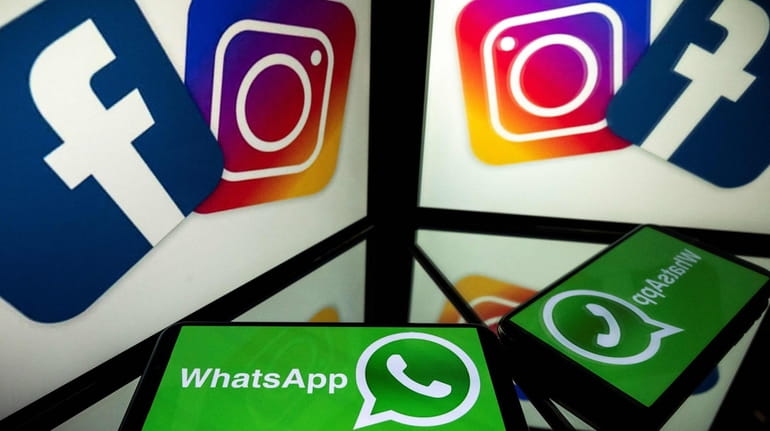Our fragile, interconnected world

The Facebook outage was another reminder of how dependent we are on these complex, and at times seemingly malignant, systems. Credit: AFP via Getty Images/LIONEL BONAVENTURE
When my 20-year-old daughter sent me a direct message via Twitter Monday, I thought it must be a spam-phish impersonating the Beloved Sapling to steal my nest egg and identity.
Her reaching out via Twitter from London, where she's studying this year, was alarming because her Twitter existence consists of three folks who follow her and five she follows. She’s never tweeted, a choice seemingly as wise as her avoidance of both hard drugs and journalism courses.
But the other ways she communicates with her mother and me were kaput, and traditional methods of parent/child transoceanic communications, the occasional postcards and echoey $74 phone calls every eight weeks, are obsolete.
WhatsApp, where we talk and text, was out. Facebook, where we track each others’ political and personal slap fights, was dark, as was backup chat app Messenger. Instagram, which men my age perceive as a home for artisanal scarves, high-end tea, home décor and the glorification of eating disorders, was fritzed.
Regular cellphone calling and texting are nixed because of confusing things like British phone SIM cards, roaming, pounds, 5G and data plans. Landline-to-landline was out because we've abandoned a 145-year-old communication technology that often worked even when everything else failed.
None of it mattered. We didn’t need to talk while the computers went kerflooey. But for people dependent on services like WhatsApp or Facebook to communicate with loved ones in other countries, it mattered.
It was another reminder, albeit a benign one, of how dependent we are on these unforgivingly fragile, complex, and at times seemingly malignant, systems.
In the past week, we saw apps relied on by billions of people crash, with no clear explanation. We heard a Facebook/Instagram whistleblower explain to Congress that the apps many Americans spend hours a day on are controlled by algorithms that adjust to our obsessions, fears and hatreds by feeding them. That keeps our profit-spinning eyeballs on the site, and destroys lives.
Perhaps most shockingly, thanks to a lawsuit, the public has learned of a baby girl, Nicko Silar, who died in an Alabama hospital in 2019 after a ransomware attack. The outage disabled monitors that should have informed staffers Silar was in distress, her umbilical cord wrapped around her neck.
And these are just a taste of our vulnerability to computer and communications failures. When Facebook's apps went down, even its own technicians could not get access to the servers to make fixes. That's 100 scary science fiction movies come to life.
You say you have $20,000 in the bank? Try proving that with no working computers or ATMs. Do you carry a passbook for the teller to stamp? You say you graduated Harvard in 2017? Prove it. Do you think colleges have file cabinets full of your report cards?
What's the plan if the next outage takes down our power grid or our transportation system?
Technology is like stilts that allow us to live in penthouses, appreciating extraordinary views of anything we wish. It is magical, and meritorious, and it has made the world less poor and less disease-ridden and better able to communicate feelings and ideas.
But if the stilts collapse, if we let them … we won’t drift gently back to where we were before. We’ll crash down suddenly, from a great height, having mostly lost the skills and trashed the tools that used to keep our worlds running.
Columnist Lane Filler's opinions are his own.

